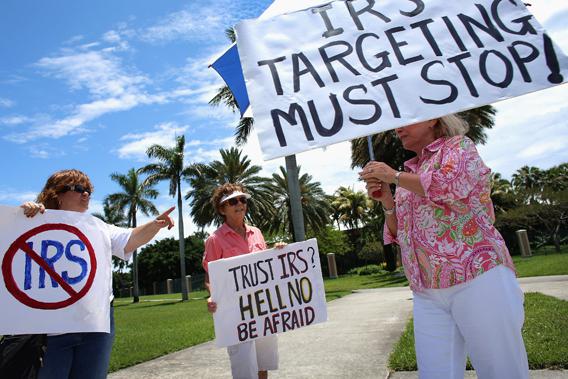At noon on Tuesday, at the urging of the local Washington, D.C. Tea Party, nearly 100 activists gathered on the Pennsylvania Avenue side of the IRS building. Down the road to their left was Capitol Hill; up the road to their right was the White House. The media-to-protester ratio clocked in at a robust one-to-five—the industry standard.
The paranoia quotient was unusually high. People who had shown up outside the IRS, bureaucrats occasionally glancing down at them, were shy about revealing their identifies. A half-dozen activists, happy enough to talk, would only give me their first names. Another man walked the perimeter wearing a paper bag with holes cut out for visibility: His “mask of intimidation and fear.” And another activist, a man wearing a T-shirt with the visage of the late Andrew Breitbart, briefly argued with a cameraman—“film my shirt, not my face”—before wrapping his head in a green scarf.
That didn’t matter, because the Tea Party was back. The IRS scandal that broke on May 10 has cultivated new, justified paranoia about the federal government. It’s been showing up in the polls. The new Washington Post/ABC News poll found that 40 percent of voters “support the Tea Party movement,” up from 32 percent last year. Independents supported the Tea Party by an 8-point margin; they used to oppose those guys, 44–34.
The downside, which only broke through the fog today, is that revitalized conservatives might have to settle for a small victory. Tying Barack Obama’s White House to the IRS scandal has become comically difficult. Oh, sure, there’s plenty of tape of the president attacking right-wing tax exemptions, and letters from Democratic senators asking the IRS to investigate that. “Under a Democratic administration,” explained National Review’s Kevin Williamson last week, “the IRS was under pressure from Democratic elected officials to investigate political enemies of the Democratic party. The agency did so.”
This is a young scandal, sure, but thus far that “pressure” hasn’t surfaced. The inspector general’s report nearly ruled it out, reporting that the Be On the Look-Out document that gave agents the anti–Tea Party guidelines was baked in-house.
“We asked the Acting Commissioner, Tax Exempt and Government Entities Division; the Director, EO; and Determinations Unit personnel if the criteria were influenced by any individual or organization outside the IRS. All of these officials stated that the criteria were not influenced by any individual or organization outside the IRS.”
With that one paragraph the (Bush-appointed) inspector general gave the Obama administration and its flacks a Cloak of Deniability. They’ve donned it every day. What started as a question of whether the White House ordered “Tea Party targeting” has become a Byzantine investigation of on what day which staffers were informed that the inspector general was digging into this. Originally, Jay Carney said the White House knew about the results “weeks” before the May 14 release of the report. Then he admitted they knew about it on April 16. This is the sort of Encylopedia Brown what-did-he-know, when-did-he-know-it investigation that looks devastating for the administration until the story is buried alive under timelines and digressions and denials.
Conservatives have started to adapt, deploying two simultaneous, only somewhat contradictory arguments. No. 1: Obama has been caught out as a “bystander,” presiding haplessly over a reckless state, learning of its abuses when he puts down the teleprompter and picks up a newspaper. No. 2: This wasn’t the only abuse of taxing/investigative power in the first Obama term. Perhaps the president was behind one of those?
It’s worth their asking. On the right, stories of IRS terror are percolating and getting treated seriously again by Republicans. Frank VanderSloot, a health supplies magnate who donated to Mitt Romney’s super PAC, had blamed Obama for a surprise 2012 audit. He’s back, asking someone to find out why the IRS was so curious about his money.
And he’s not half as compelling as Catherine Engelbrecht, a Texas manufacturer who went on to found the “voter integrity” coalition True the Vote. She was hounded not just by the IRS, but by OSHA regulators, by inquisitive FBI agents, and—complicating the Obama narrative a little—the Texas Commission on Environmental Quality. On Tuesday morning she teamed up with Sen. Jon Cornyn for a conference call on her struggle. On Tuesday afternoon, she sued the IRS.
It’s like an unexpected law of physics: The Obama administration slips away from the scandal and the IRS sinks further in. On Tuesday afternoon the Los Angeles Times reported that lie-prone IRS tax-exempt organizations director Lois Lerner would show up in Congress but plead the Fifth. Instantly, Lerner became the great public villain of the scandal, a damage-conscious figure in an increasingly disgraced organization.
But conservatives want and expect this story to run through the White House. At the IRS rally, as a George Washington impersonator posed in front of the agency’s brutalist sign for a succession of TV cameras, activists withheld their names and asked me why the president wasn’t being blamed for the scandal.
“They could have a picture of Obama killing puppies and they wouldn’t believe he was really killing them,” said “Beth C,” a middle-aged activist whose red shirt portrayed a screaming eagle superimposed on an American flag.
“Or they could have a picture of him eating the dog,” joked “Melinda,” cradling one of the “Audit the IRS” signs waved during the brief rally.
“Exactly,” laughed Beth. “Eating the dog!”
They were sharing an in-joke, a reference to the fact that young Barack Obama ate “dog meat” while he lived in Indonesia. That anecdote thrilled conservatives, from the jungles of blog comments to the heights of the Romney campaign. Yet it never really wounded Obama. This was getting to be a pattern.
